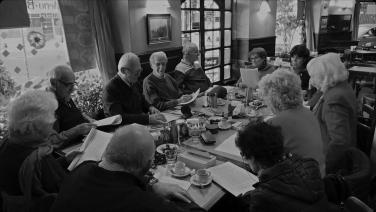
El tiempo perdido, María Álvarez, Argentina, 2020, 102'
Best Argentine Film at the Mar de Plata International Film Festival 2020.
On 30 December 2017 we ended the Tabakalera film season with the screening of the documentary Las cinéphilas (The cinephiles), directed by María Álvarez, and we offered that showing as a gift to our audience. The film, the first by its director, was a tribute to the cinephiles of the world: in this case, retired women from Spain, Uruguay and Argentina who go to the cinema every day and whose day-to-day lives revolve around the films that they find in the film libraries of their respective cities. The cinema, and the act of going to the cinema as part of our lives, is what that film portrays.
Three years later, María Álvarez returns to our cinema with another gift in the form of a film and with another tribute film.
For the Tabakalera film team, the choice of the first film of the year, the one to be shown on 1 January, is very important. This decision on how to start the season has a symbolic value that helps us define the path that the new season will take. It is always a conscious gesture in the form of a plea and a proclamation. “We chose this film, because this is who we are,” is what we want to say.
María Álvarez returns with another documentary that has been filmed over the last four years, and that in some ways completes her previous film: in that film the protagonists were women who go to the cinema, and in this one the protagonists are women and men who read aloud.
The synopsis is simple: a group of people have been meeting for eighteen years in a bar in Buenos Aires to read the same book over and over again: In Search of Lost Time, by Marcel Proust. Criss-crossing their own memories and emotions, with humour and fear and in shared company the group gives the novel a new and personal meaning.
In these times where the virtual world, distances and screens that fit in your pocket dominate everything, this film is both an oasis and a gesture of resistance: because what could be more revolutionary than a group of people gathering to read aloud a novel of seven volumes and thousands of pages?
There is in that simple and direct gesture a response to the world. “This is who we are,” they are saying. Readers. And they keep reading, until a moment arrives, as it does in all great works, when literary fiction and life outside the book begin to intermingle. If art ever served a purpose, perhaps it is this.
This is a film about the passing of time, the fear of being alone and company, the joy of meeting, the loneliness of cities, the humour of life, the bitterness of what has been lost, the hope for the next page, and the refuge of literature and art as places to return to again and again, when there are fewer and fewer places to return to.
Here are two miracles: the first, that a film makes us want to read; and the second, that a film makes us want to listen. And a third illumination: this is one of those films that you can imagine being shown a hundred years from now, perhaps in a museum, perhaps in a museum of remote times. “This is what we were,” someone will say then. Women and men reading slowly and aloud in a refuge in the big city while the world continued to spin towards its own vertigo.
Best film in the Argentinian International Film Festival fo Mar de Plata.
